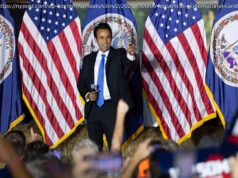President Trump and congressional Republicans are seeking to weaponize the Supreme Court fight as they head into the final month of campaigning before the November…
President Trump and congressional Republicans are seeking to weaponize the Supreme Court fight as they head into the final month of campaigning before the November midterm elections.
The Senate confirmed Brett Kavanaugh on Saturday on almost entirely Republican votes, giving the party, and Majority Leader Mitch McConnell (R-Ky.), a significant victory less than a month out from the midterms.
Though Republicans hold a favorable Senate map, they are fighting historical headwinds as they try to keep control of Congress. They hope Kavanaugh’s confirmation and the deeply partisan fight over his nomination will help their party and give their base a shot in the arm.
ADVERTISEMENT
Taking a media victory lap Saturday in the wake of the confirmation fight, the normally tight-lipped Senate Majority Leader Mitch McConnell (R-Ky.) pledged to tout the fight over Kavanaugh––and the win for Republicans––in the final four weeks of campaigning before the Nov. 6 elections.
«It certainly had a good impact for us. Our base is fired up. We finally discovered the one that would fire up the Republican base that we didn’t think of it, and the other side did it,” McConnell said reporters during Kavanaugh’s vote.
McConnell told The Hill in an interview Saturday that he was thrilled that his GOP colleagues weren’t “intimidated by the mob that descended on the Capitol and harassed our members at their homes and in the halls,” predicting the all-out brawl over Kavanaugh would ultimately help unify Republicans and electrify GOP voters.
“I’m doubly upbeat after this Supreme Court fight, which has been like a shot of adrenaline in our campaigns,” he added in the interview .
The pieces for Kavanaugh’s confirmation, which had seemed to be a lock for most of the summer before falling into question amid sexual assault allegations last month, didn’t fall into place until Friday, the day before the final vote.
McConnell said he wasn’t sure if they had the votes to get Kavanaugh through a key Friday vote to advance his nomination until the 10:30 a.m. vote began—an out-of-character decision for a leadership team that generally doesn’t bring things to the floor without knowing the expected outcome of a vote.
Kavanaugh’s smooth nomination was all-but derailed after several women came forward to accuse him of sexual misconduct. The allegations, which Kavanaugh denied, raised fresh questions about whether he would ultimately withdraw, a possibility that the president played down amid the firestorm.
Instead, McConnell shot down talk of Kavanaugh withdrawing and GOP leadership stayed in continuous contact with the group of senators that they knew would ultimately decide if he was confirmed: GOP Sens. Susan Collins (Maine), Lisa Murkowski (Alaska) and Jeff Flake (Ariz.).
Republicans hold a slim 51-seat majority and that they are hoping to expand in November. But McConnell acknowledges they’re locked in a “knife fight” in several states that will make or break if they keep their majority: Arizona, Nevada, Montana, North Dakota, Missouri, Indiana, Tennessee, West Virginia and Florida.
In most of those races Democrats are trying to hold on to seats in red and purple states that Trump won in the 2016 election. But in Tennessee and Arizona, seats are being vacated by retiring GOP Sens. Bob Corker (Tenn.) and Flake, and Sen. Dean Heller (R-Nev.) is the only Republican incumbent running for reelection in a state won by Hillary Clinton .
McConnell argued Saturday that the GOP base is “on fire,” recalling that he was recently talking to his political advisers about “the advantage these guys by their tactics have given to us.”
The boost in confidence by GOP leadership comes after Trump leaned in hard for Kavanaugh this week during political rallies and on social media.
Trump went to the mat for Kavanaugh during a rally in Mississippi, saying Democrats were trying to “destroy” Kavanaugh and «obstruct, resist, demolish, destroy and delay.”
“How did you get home?’ ‘I don’t remember.’ ‘How did you get there?’ ‘I don’t remember.’ ‘Where is the place?’ ‘I don’t remember.’ ‘How many years ago was it?’ ‘I don’t know,’” Trump said appearing to mock Christine Blasey Ford but drawing cheers and applause.
In the wake of the FBI report, Trump blasted Senate Democrats on Twitter, saying even 100 reports “would still not be good enough for the Obstructionist Democrats.”
Trump’s rhetoric is already having a trickle-down effect in key Senate races. GOP candidates, backed by the National Republican Senatorial Committee (NRSC), are pointing to opposition to Kavanagh as the latest sign that vulnerable are caving to the “left” and out of touch with home-state voters.
Indiana GOP Senate nominee Mike Braun, and the NRSC, are seizing on reports that Sen. Kamala Harris (D-Calif.) sent an email raising money for Sen. Joe Donnelly ’s (D-Ind.) campaign over his opposition to Kavanaugh. Josh Kelley, a spokesman for Braun, called Donnelly and Harris “media circus Democrats” that are trying to “smear” Kavanaugh, and accused Donnelly of “cashing in” on his opposition “ to advance his political career.”
The North Dakota Republicans accused Democratic Sen. Heidi Heitkamp (N. D.) of opposing Kavanaugh and taking an “anti-life, anti-second amendment, and anti- North Dakota vote” to “appease her liberal Democratic base.” Heitkamp touted her work on behalf of women when she announced her opposition, noting that if she was making a “political decision” she would have supported Kavanaugh.
Even Sen. Joe Manchin (D-W. Va.), who voted for Kavanaugh, did not escape Republican wrath. After Manchin announced he would support Kavanaugh, the president’s eldest son Donald Trump Jr. blasted him in a tweet as a “lyin’ liberal.”
“A real profile in courage…. Waited until Kavanaugh had enough votes secured before he announced his support. I bet he had another press release ready to go if Collins went the other way,” Trump Jr. wrote .
Manchin said on Saturday that the White House was aware that he was leaning yes on Kavanaugh before he announced his position.






